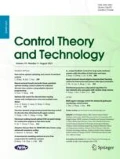Abstract
In this paper, a computationally efficient method is proposed for automated design of the prefilters for multivariable systems. In quantitative feedback theory (QFT) method, proposed by Horowitz, the prefilter is designed to achieve the desired tracking specifications. In the proposed approach, we pose the prefilter design problem as an interval constraint satisfaction problem and solve it using the well-established interval constraint satisfaction techniques. The proposed method finds optimal values of the parameters of fixed structure prefilter within the initial search domain. An approach based on prefilter synthesis for single-input single-output is already developed. The purpose of this paper is to extend this approach to QFT prefilter design for general multivariable systems. To validate the above design approach, we applied the method to a laboratory setup of magnetic levitation system.
Similar content being viewed by others
References
G. Stein, M. Athans. The LQG/LTR procedure for multivariable feedback control design. IEEE Transactions on Automatic Control, 1987, 32(2):105–114.
D. C. Youla, J. J. Bongiorno. A feedback theory of two-degree-of-freedom optimal Wiener-Hopf design. IEEE Transactions on Automatic Control, 1987, 30(7):653–665.
D. C. Youla, H. A. Jabr, J. J. Bongiorno. Modern Weiner Hopf design of optimal controllers — Part I: the single input-output case. IEEE Transactions on Automatic Control, 1976, 21(1):3–13.
G. Zames, B. Francis. Feedback, minimax sensitivity, and optimal robustness. IEEE Transactions on Automatic Control, 1983, 28(5):585–601.
J. C. Doyle. Analysis of feedback systems with structured uncertainties. IEE Proceedings — Control Theory and Applications, 1982, 129(6):242–250.
I. M. Horowitz. Quantitative Feedback Design Theory (QFT). Boulder: QFT Publications, 1993.
S. Skogestad, I. Postlethwaite. Multivariable Feedback Control: Analysis and Design. Chichester: John Wiley & Sons, 2005.
C. H. Houpis, S. J. Rasmussen. Quantitative Feedback Theory — Fundamentals and Applications. New York: Marcel Dekker, 1999.
A. Krokhin, P. Jeavons, P. Jonsson. Constraint satisfaction problems on intervals and lengths. SIAM Journal on Discrete Mathematics, 2004, 17(3):453–477.
P. S. V. Nataraj, S. Tharewal. Automatic design of QFT prefilter using interval analysis. IEEE International Symposium on Computer Aided Control Systems Design. Piscataway: IEEE, 2004:156–160.
P. S. V. Nataraj, M. M. Deshpande. Implementation of fixed structure QFT prefilter synthsised using interval constraint satisfaction technique. International Journal of Reliability and Safety, 2012, 6(1):255–281.
M. D. Patil, P. S. V. Nataraj, V. A. Vyawahare. Automated synthesis of fractional-order QFT prefilter using interval constraint satisfaction technique. Proceedings of the 5th IFAC Symposium On Fractional Differentiation and its Applications. Nanjing, 2012.
E. Boje. Prefilter design for tracking error specifications in QFT. International Journal of Robust and Nonlinear Control, 2003, 13(7):637–642.
S. M. M. Alavi, A. K. Sedigh, B. Labibi. Pre-filter design for tracking error specifications in MIMO-QFT. Proceedings of the 44th IEEE Conference on Decision and Control, and the European Control Conference. New York: IEEE, 2005:6466–6471.
P. Melchior, C. Inarn, A. Oustaloup. Path tracking design by fractional prefilter extension to square MIMO systems. Proceedings of the ASME International Design Engineering Technical Conferences & Computers and Information in Engineering Conference. New York: American Society of Mechanical Engineers, 2010:1315–1320.
Educational Control Products. Model 730: Magnetic Levitation. 1999: http://www.ecpsystems.com/controls maglevit.htm.
F. Benhamou, F. Goualard, L. Granvilliers. Revising hull and box consistency. Proceedings of the 16th International Conference on Logic Programming. Cambridge: MIT Press, 1999:230–244.
P. S. V. Nataraj, R. Kalla. Computation of stability margins for uncertain linear fractional-order systems. Journal of Dynamic Systems, Measurement, and Control, 2010, 132(1): doi:10.1115/1.4000073.
L. Granvilliers. RealPaver: an interval solver using constraint satisfaction techniques. ACM Transactions on Mathematical Software, 2006, 32(1):138–156.
C. M. Chien, B. C. Wang, I. M. Horowitz. An alternative method for design of MIMO system with large plant uncertainty. Control Theory and Advanced Technology, 1993, 9(4):955–969.
M. D. Patil, P. S. V. Nataraj. Automated synthesis of multivariable QFT controller using interval constraint satisfaction technique. Journal of Process Control, 2012, 22(4): 751–765.
Author information
Authors and Affiliations
Corresponding author
Additional information
Mukesh D. PATIL obtained his Ph.D. from Systems and Control Engineering at Indian Institute of Technology Bombay, Mumbai, India, in 2013. He obtained his M.Tech. from Systems and Control Engineering at Indian Institute of Technology Bombay, Mumbai, India, in 2002. He is working as Professor at Ramrao Adik Institute of Technology, Nerul, Navi Mumbai, India. His current research interests are in the areas of robust control, fractional-order control and signal processing. He has also published more than 60 papers in leading international journals and conferences.
P. S. V. NATARAJ is a professor of Systems and Control Engineering Group at IIT Bombay, India. He obtained his Ph.D. from IIT Madras, India in Process dynamics and Control in 1987. He joined as the faculty of the Systems and Control Engineering Group at IIT Bombay in 1988. He has been involved and teaching for about 25 years at IIT Bombay. His current research interests are in the areas of robust and fractional order control, global optimization, reliable computing, parallel computing (GPU), and robust statistics. He guided more than 100 M.S. degree candidates, and guided (or is guiding) 27 Ph.D. candidates in these areas. He has also published more than 100 papers in leading international journals and conferences. He is an editor of two international journals: International Journal of Automation and Control (Inderscience) and Opsearch (Springer), and an associate editor of the International Journal of Systems Assurance Engineering and Management (Springer). He was the chairman or co-chairman of several international conferences sponsored by IEEE and other societies. He also chaired and co-chaired several sessions in various international conferences in India and abroad.
Rights and permissions
About this article
Cite this article
Patil, M.D., Nataraj, P.S.V. QFT prefilter design for multivariable systems using interval constraint satisfaction technique. J. Control Theory Appl. 11, 529–537 (2013). https://doi.org/10.1007/s11768-013-2195-7
Received:
Revised:
Published:
Issue Date:
DOI: https://doi.org/10.1007/s11768-013-2195-7




